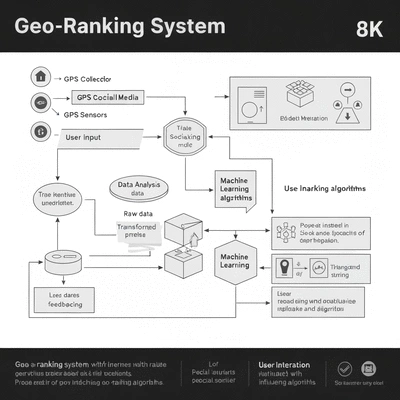Curious about how technology can improve your geo-ranking applications? Understanding multi-agent systems is key. These systems can transform not just how you gather data, but how you turn that data into actionable insights that drive business success.
What You Will Learn
- The role of multi-agent systems in enhancing geo-ranking applications through collaboration and efficiency.
- How Google AI agents automate tasks and deliver insights by mimicking human decision-making processes.
- The importance of the Agent Development Kit (ADK) in streamlining the creation of AI agents.
- Machine learning's impact on personalization and accuracy in geo-ranking systems.
- How Natural Language Processing (NLP) enhances user interactions and query understanding in geo-rankers.
- Key Performance Indicators (KPIs) to measure the success of your Geo-Ranker app effectively.
- Insights from real-world case studies showcasing the benefits and challenges of geo-ranking applications.
- Leveraging predictive analytics for future performance forecasting and resource allocation.
Core Components of Geo-Ranking Systems
This visual outlines the foundational elements and key processes that empower modern geo-ranking applications, from data acquisition to performance evaluation.
Google AI Agents: Core Functionality
- Data Collection: Gather from diverse sources.
- Analysis: Identify trends & patterns.
- Decision Making: Informed actions for user experience.
Automate tasks & deliver insights by mimicking human decision processes.
Agent Development Kit (ADK) Benefits
- Framework Support: Streamlines development.
- Pre-built Functions: Saves time & resources.
- Integration: Seamless with other AI services.
Provides a structured framework for efficient agent design and deployment.
Machine Learning in Geo-Ranking
- Data-Driven Insights: Predicts user preferences.
- Continuous Learning: Algorithms adapt & improve.
- Personalization: Tailors search experience.
Analyzes vast data to improve ranking algorithms based on user behavior.
Natural Language Processing (NLP) Enhancements
- Query Understanding: Deciphers user intent.
- Contextual Awareness: Factors in user location.
- User Engagement: Fosters natural interactions.
Enables systems to understand human language for precise, context-aware results.
Key Performance Indicators (KPIs) for Geo-Ranking
- User Engagement: Interaction frequency & duration.
- Accuracy: How well locations are ranked.
- Conversion Rates: Desired user actions.
- User Satisfaction: Feedback through surveys.
Essential metrics to measure the success and effectiveness of a Geo-Ranker app.
Predictive Analytics for Performance Forecasting
- Trend Analysis: Identify patterns in user data.
- Scenario Simulation: Model app changes effects.
- Resource Allocation: Efficiently target support needs.
Leverages historical data to forecast future trends and user behaviors.
Understanding Multi-Agent Systems for Geo-Ranking Applications
In today’s digital landscape, multi-agent systems are pivotal for enhancing geo-ranking applications. These systems utilize multiple autonomous agents that collaboratively address complex problems, providing more accurate and effective solutions. As discussed in research on multi-agent systems and their applications in artificial intelligence, understanding how these agents operate can unlock their full potential in various applications, including search engine optimization and location-based services.
At The Stone Builders Rejected, we recognize that integrating these technologies can significantly impact how businesses operate and interact with their audiences. Let's dive deeper into the foundational elements of these systems.
What Are Google AI Agents and How Do They Work?
Google AI agents are designed to automate tasks and deliver insights by mimicking human-like decision-making processes. These agents work through a combination of algorithms and machine learning techniques, allowing them to learn from their environment and improve over time. Essentially, they gather data, analyze it, and yield actionable insights that can drive business decisions.

- Data Collection: Agents gather data from various sources, including user interactions and external databases.
- Analysis: They analyze this data to identify trends and patterns that are essential for geo-ranking applications.
- Decision Making: Based on the analysis, agents can make informed decisions and suggestions to improve user experience.
This technology is not just a trend; it’s a fundamental shift in how we approach problem-solving in a data-driven world. Understanding these agents' functionalities can significantly enhance your approach to developing geo-ranking applications.
The Role of Agent Development Kit (ADK) in Building Applications
The Agent Development Kit (ADK) is a powerful tool that facilitates the creation of AI agents for various applications. It provides developers with a structured framework to design, implement, and deploy these agents efficiently. By using the ADK, developers can focus more on innovation rather than getting bogged down with the technicalities of agent design.
- Framework Support: The ADK offers a robust framework that streamlines the development process.
- Pre-built Functions: It includes a variety of pre-built functions that save time and resources.
- Integration Capabilities: The ADK allows seamless integration with other AI services and APIs, making it easier to enhance your application’s capabilities.
With these features, the ADK becomes an indispensable asset for developers looking to build sophisticated AI-driven applications quickly and effectively. It's a game changer for anyone serious about entering the geo-ranking space!
Exploring Machine Learning in Geo-Ranking Systems
Machine learning plays a crucial role in geo-ranking systems by providing the capability to analyze vast amounts of data and derive useful insights from it. This technology enables applications to improve their ranking algorithms based on user behavior, preferences, and patterns observed over time.
- Data-Driven Insights: Machine learning helps in predicting user preferences, ensuring that the most relevant results are displayed.
- Continuous Learning: The algorithms adapt and improve as they process more data, enhancing accuracy over time.
- Personalization: By understanding individual user behavior, machine learning can tailor the search experience, making it more effective.
As we implement these systems, we gain not only efficiency but also a deeper understanding of our users. This insight allows us to create experiences that resonate, which is a core principle at The Stone Builders Rejected.
How Natural Language Processing Enhances Geo-Ranker Functionality
Natural Language Processing (NLP) is another pivotal component that enhances the functionality of geo-ranking applications. NLP enables systems to understand and interpret human language, making interactions more intuitive. By leveraging NLP, geo-rankers can analyze search queries more effectively and deliver precise results based on user intent.

- Enhanced Query Understanding: NLP helps in deciphering the meaning behind user queries, leading to better search results.
- Contextual Awareness: It enables the system to factor in the context of a user’s location, improving relevance.
- User Engagement: More natural interactions foster user engagement, enhancing the overall experience.
Incorporating NLP into your geo-ranking applications isn’t just an upgrade; it’s a necessity in today’s competitive landscape. This approach aligns with our mission at The Stone Builders Rejected to provide insightful and relevant content that resonates with our audience.
Pro Tip
To maximize the effectiveness of your geo-ranking applications, consider implementing a feedback loop where users can provide insights on the accuracy and relevance of search results. This user-generated data not only enhances your machine learning models but also fosters a community that feels invested in the application's development.
Frequently Asked Questions (FAQs)
Evaluating the Impact of Your Geo-Ranker App
Once you've developed your Geo-Ranker app, it's vital to assess its impact on users and the overall effectiveness of the system. Understanding how well your app performs can help you refine its features and improve user satisfaction. Here, we'll dive into key areas of evaluation and the steps you can take to measure success.
To effectively evaluate your app, you should focus on a few essential metrics that provide insights into its performance. These metrics can guide your decisions and help shape future updates, ensuring that your application remains relevant and user-friendly.
Measuring Success: Key Performance Indicators for Geo-Ranking
Key Performance Indicators (KPIs) are crucial for understanding the success of your Geo-Ranker app. They provide a tangible way to measure progress and effectiveness. Here are some essential KPIs to consider:
- User Engagement: Track how often users interact with your app and the duration of their sessions.
- Accuracy of Geo-Ranking: Assess how well your app ranks locations based on user inputs and data.
- Conversion Rates: Measure how many users take desired actions, such as clicking links or making purchases.
- User Satisfaction Scores: Collect feedback through surveys to understand user experience.
By focusing on these KPIs, you'll gain valuable insights that can help you optimize your Geo-Ranker application and enhance user engagement.
Real-World Case Studies: Success Stories and Challenges
Learning from real-world examples can provide crucial insights into the challenges and triumphs faced by others in the field. Let's take a look at a couple of inspiring case studies:
- Case Study 1: A local startup implemented a Geo-Ranker app to optimize its delivery routes. By leveraging real-time data, they reduced delivery times by 20%, significantly increasing customer satisfaction.
- Case Study 2: Another company faced challenges with inaccurate location data, leading to poor ranking results. By refining their API integration, they improved ranking accuracy by 30%, which boosted user trust.
These case studies highlight the importance of continuous improvement and adaptability in your approach to building a successful Geo-Ranker app.
Using Predictive Analytics for Future Performance Forecasting
Predictive analytics can play a pivotal role in enhancing the longevity and effectiveness of your Geo-Ranker application. By analyzing historical data, you can forecast future trends and user behaviors. Here are a few ways to leverage predictive analytics:
- Trend Analysis: Use data from user interactions to identify patterns and anticipate future needs.
- Scenario Simulation: Model different scenarios to see how changes in your app might affect user engagement and outcomes.
- Resource Allocation: Forecasting can help you allocate resources more efficiently, targeting areas that may require additional support.
Incorporating predictive analytics is a powerful way to stay ahead of the curve, allowing you to make informed decisions that enhance your Geo-Ranker app's performance.
Next Steps and How to Enhance Your Geo-Ranker Application
Now that you've evaluated your Geo-Ranker app, it’s time to consider how to take it to the next level. Whether you're looking to optimize for local SEO or implement new features, there are several strategies to enhance your application.
Continuous improvement is key in the fast-paced world of technology. As new challenges arise, so do opportunities to innovate and enhance user experiences.
Recap of Key Points
Here is a quick recap of the important points discussed in the article:
- Multi-Agent Systems: These systems improve geo-ranking applications by utilizing multiple autonomous agents to collaboratively solve complex problems.
- Google AI Agents: They automate tasks and analyze data to enhance decision-making and improve user experiences.
- Agent Development Kit (ADK): A crucial tool that streamlines the development of AI agents, offering framework support and integration capabilities.
- Machine Learning: Essential for analyzing user data and improving ranking algorithms based on behavior and preferences.
- Natural Language Processing (NLP): Enhances geo-ranking functionality by improving query understanding and user engagement.
- Key Performance Indicators (KPIs): Metrics such as user engagement, accuracy, and conversion rates are vital for evaluating the success of geo-ranking applications.
- Predictive Analytics: Helps forecast trends and user behavior, allowing for informed decisions that enhance app performance.






